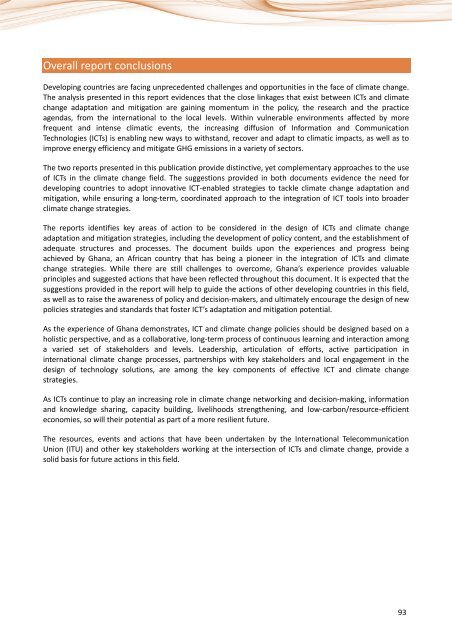Information and communication technologies (ICTs) and ... - ITU
Information and communication technologies (ICTs) and ... - ITU
Information and communication technologies (ICTs) and ... - ITU
You also want an ePaper? Increase the reach of your titles
YUMPU automatically turns print PDFs into web optimized ePapers that Google loves.
Overall report conclusions<br />
Developing countries are facing unprecedented challenges <strong>and</strong> opportunities in the face of climate change.<br />
The analysis presented in this report evidences that the close linkages that exist between <strong>ICTs</strong> <strong>and</strong> climate<br />
change adaptation <strong>and</strong> mitigation are gaining momentum in the policy, the research <strong>and</strong> the practice<br />
agendas, from the international to the local levels. Within vulnerable environments affected by more<br />
frequent <strong>and</strong> intense climatic events, the increasing diffusion of <strong>Information</strong> <strong>and</strong> Communication<br />
Technologies (<strong>ICTs</strong>) is enabling new ways to withst<strong>and</strong>, recover <strong>and</strong> adapt to climatic impacts, as well as to<br />
improve energy efficiency <strong>and</strong> mitigate GHG emissions in a variety of sectors.<br />
The two reports presented in this publication provide distinctive, yet complementary approaches to the use<br />
of <strong>ICTs</strong> in the climate change field. The suggestions provided in both documents evidence the need for<br />
developing countries to adopt innovative ICT-enabled strategies to tackle climate change adaptation <strong>and</strong><br />
mitigation, while ensuring a long-term, coordinated approach to the integration of ICT tools into broader<br />
climate change strategies.<br />
The reports identifies key areas of action to be considered in the design of <strong>ICTs</strong> <strong>and</strong> climate change<br />
adaptation <strong>and</strong> mitigation strategies, including the development of policy content, <strong>and</strong> the establishment of<br />
adequate structures <strong>and</strong> processes. The document builds upon the experiences <strong>and</strong> progress being<br />
achieved by Ghana, an African country that has being a pioneer in the integration of <strong>ICTs</strong> <strong>and</strong> climate<br />
change strategies. While there are still challenges to overcome, Ghana’s experience provides valuable<br />
principles <strong>and</strong> suggested actions that have been reflected throughout this document. It is expected that the<br />
suggestions provided in the report will help to guide the actions of other developing countries in this field,<br />
as well as to raise the awareness of policy <strong>and</strong> decision-makers, <strong>and</strong> ultimately encourage the design of new<br />
policies strategies <strong>and</strong> st<strong>and</strong>ards that foster ICT’s adaptation <strong>and</strong> mitigation potential.<br />
As the experience of Ghana demonstrates, ICT <strong>and</strong> climate change policies should be designed based on a<br />
holistic perspective, <strong>and</strong> as a collaborative, long-term process of continuous learning <strong>and</strong> interaction among<br />
a varied set of stakeholders <strong>and</strong> levels. Leadership, articulation of efforts, active participation in<br />
international climate change processes, partnerships with key stakeholders <strong>and</strong> local engagement in the<br />
design of technology solutions, are among the key components of effective ICT <strong>and</strong> climate change<br />
strategies.<br />
As <strong>ICTs</strong> continue to play an increasing role in climate change networking <strong>and</strong> decision-making, information<br />
<strong>and</strong> knowledge sharing, capacity building, livelihoods strengthening, <strong>and</strong> low-carbon/resource-efficient<br />
economies, so will their potential as part of a more resilient future.<br />
The resources, events <strong>and</strong> actions that have been undertaken by the International Tele<strong>communication</strong><br />
Union (<strong>ITU</strong>) <strong>and</strong> other key stakeholders working at the intersection of <strong>ICTs</strong> <strong>and</strong> climate change, provide a<br />
solid basis for future actions in this field.<br />
93

















